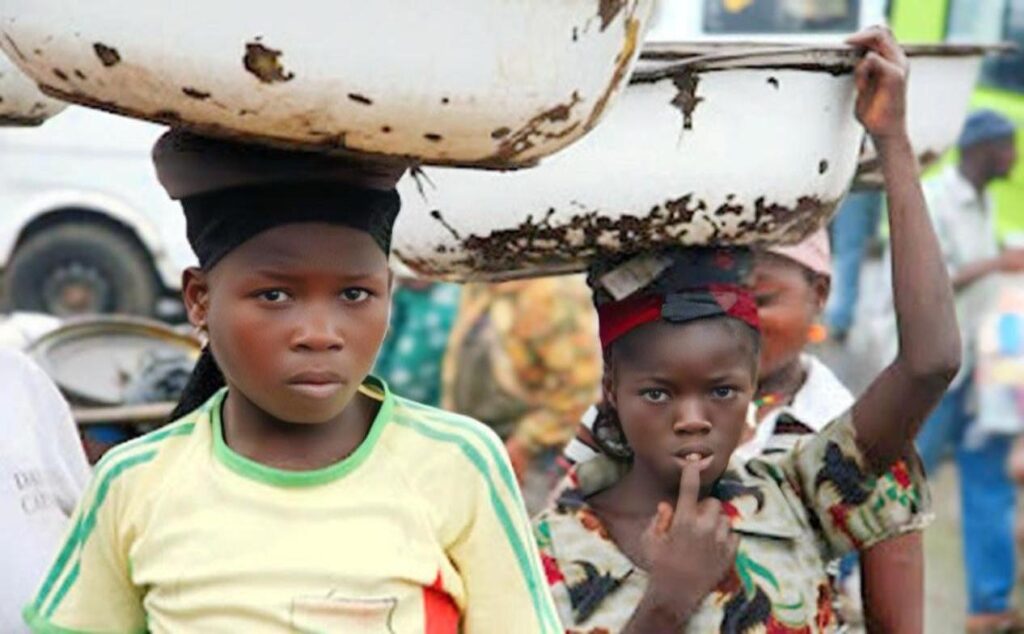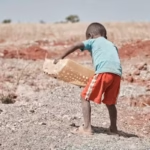Why should a child be forced into labour instead of enjoying the joys of childhood? Why are children given tools to earn a living instead of pens and pencils to learn? These urgent questions underscore the critical need to combat child labour in Ghana, where many children face a harsh reality where their innocence is stripped away by exploitation and hardship. According to the International Labour Organization, approximately 160 million children are engaged in child labor worldwide, with Africa accounting for nearly half of this number. This highlights the urgent need for global action.
Child labour is a pressing concern in our communities and across the globe. Every day, the streets are filled with children engaged in various forms of work, which not only harms their health and well-being but also prevents them from attending school. Many of these children are involved in hazardous jobs that threaten their physical, mental, emotional, and social development.

Society often forgets that these vulnerable young ones deserve better than being sent to the streets and market centers to labor for survival. Forced into a harsh world, they become like sheep among wolves, struggling to fend for themselves. This situation leads to increased illiteracy, teenage pregnancies, social vices such as child prostitution, and other dangers associated with early exposure to labor.
“We do not inherit the earth from our ancestors; we borrow it from our children.” This sentiment highlights the need to prioritize the welfare of future generations. Why do we subject our young ones to heartbreaking conditions where, if they do not work, they have nothing to eat? Why are they exposed to insults and beatings from those who should protect them—parents and guardians?
Children should learn, not earn. They deserve books, not tools for survival. Childhood is a brief period meant for education and growth, laying the foundation for their future. Education is a child’s birthright, yet many are denied this due to economic hardships.
Ghana’s legal framework offers some protections against child labour, setting the minimum employment age at 15 and allowing 13-year-olds to engage in light work that does not harm their education. The law prohibits night work for children, with penalties for violators. However, enforcement is weak. Many children still toil in hazardous conditions after dark with their rights and safety disregarded.
Poverty, parental neglect, limited access to education, high unemployment, and inadequate enforcement of laws are the primary drivers of child labor in Ghana.

Families living in extreme poverty often rely on their children’s meager earnings for survival, perpetuating a cycle of exploitation and deprivation. The high poverty rate forces many children out of school and into the labor force, widening the gap between the rich and the poor.
Parental irresponsibility, including the failure to prioritize education, exacerbates the problem. Some parents do not adequately plan before having children, resulting in financial constraints that compel them to send their children to work. Limited job opportunities lead parents to send their children to urban areas as domestic workers, exposing them to potential abuse.
Whilst Ghana has made strides in addressing child labor, more concerted efforts are needed to tackle this pervasive issue. To effectively combat child labor, the following recommendations are crucial.
Strict enforcement of existing laws to identify, prevent, and eliminate child labor is essential to combating child labor. The government must ensure all children below the statutory employment age are in school and protected from exploitation.
Community monitoring committees should be established to ensure children are not engaged in labor activities that violate the law.
Parents must prioritize their children’s education and welfare rather than shifting these responsibilities onto the children.
Organizations and activists should intensify efforts to combat child labour, advocating children’s rights to enjoy their childhood without the burden of labour.
As part of our commitment to safeguarding children and combating child labour, the Women of Legacy Foundation (WOLF) has initiated several impactful programs aimed at addressing these challenges.
Recognizing that education is a fundamental right, WOLF’s Back-to-School Program ensures that vulnerable children have access to educational opportunities. This initiative provides essential school supplies, scholarships, and support to families, alleviating the financial burden that often forces children into the workforce. By facilitating access to education, we aim to break the cycle of poverty and child labor, empowering children to pursue their dreams and futures without the shackles of labour.
Our Smiles on the Streets program directly addresses the plight of street children, providing them with essential services such as food, healthcare, and educational opportunities. Through Smiles on the Streets, WOLF creates a supportive environment that fosters a sense of belonging and hope among these children. By offering mentorship and guidance, we strive to reintegrate street children into society and equip them with the tools needed for a brighter future.
Let us unite in our unwavering commitment to eradicate child labour and ensure every child has the opportunity to thrive. This is not just a local issue but a global challenge that requires our collective efforts. We invite individuals and organizations worldwide to join our fight against child labor, advocating for children’s rights and taking concrete actions in our communities. Together, we can build a brighter, more equitable future for all children, where joy and opportunity define every child’s journey.
Read Also: Upholding Dignity: Confronting the Atrocity of Female Genital Mutilation



